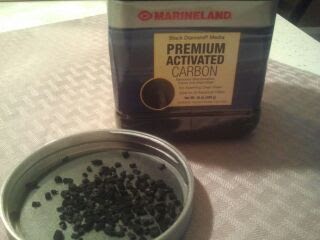Teeth whitening is big bussiness. From professional whitening sessons to whitening strips to gum that even claims to whiten - everyone wants that brillant, dazzling smile.
The most popular whitening strategy is to use hydrogen peroxide. Dentist use hydrogen peroxide as a bleching agent which uses acid to bleach the germs on the surface of the teeth that cause discoloration.
The downside to using hydrogen peroxide is mainly due to the fact that it is an acid. It can cause your teeth and gums to be overly sensitive. You may even see your gums swollen or inflamed after whitening. It also has the potential to actually increase the porosity of your teeth.
Activated Carbon
Activated carbon is best known as an emergency decontaminant in the GI tract - laymens terms: it' s given to people who overdose on drugs or chemicals. This is because of its adsorption (yes, adsorption not absorption) ability.
Briefly - to understand why activated carbon is AWESOME, let' s learn some science.
Surface Area and Adsorption
Activated charcoal is most commonly made from coconut shells. When charcoal is termed "activated" it means that it has been produced to have a very fine particle size - which increases the overall surface area.
 |
| an electron microscope image of activated charcoal |
One standard 50-gram dose of activated charcoal has the surface area of TEN football fields.
This is significant when dealing with adsorption - this is because adsorption is different from absorption in the sense that it focuses on the surface area NOT volume.
A good analogy is someone drinking a glass of water. When you drink the water you are technically absorbing the fuild and making it a part of you. Adsorption happens when you get clumsy and spill the water all over your shirt. The water does not become you but instead it just bonded physically to your surface (your shirt).
Activated Charcoal and Teeth Whitening
Activated charcoal is amazing at whitening teeth because of its adsorption qualities - specifically of tannins. Tannins are in the food and beverages we consume that stain our teeth (wine, tea,cola, sauces, sweets,etc) and activated charcoal is remarkably efficient and fast at adsorbing them.
It even has the ability to be helpful at adjusting the pH balance in the mouth - which is effective at preventing cavities and bad breath.
I purchased my activated carbon through Amazon. Don' t make the same mistake as me - make sure it' s already in it' s powder form. (I bought mine in crystal form and had to pulverize it –bah.)
 |
| This is a picture BEFORE pulverizing into a powder - to skip this step simply buy in powder form. |


It has been some time since I visited website with such high quality information. Thank you so much for providing such helpful information. This is really informative and I will for sure refer my friends the same. Thanks.Teethwhitening
ReplyDeleteshameless plug? lol
DeleteUseful information like this one must be kept and maintained so I will put this one on my bookmark list! Thanks for this wonderful post and hoping to post more of this!
ReplyDeleteteeth whitening Birmingham
Thanks for the tip! My teeth are sensitive too...
ReplyDeleteteeth whitening northampton
That’s really nice! And because it’s not a chemical-based cleaner, it won’t hurt your teeth and gums. It’s perfect for those who have sensitive gums. But of course, it's best to consult with your dentist first before trying it out, just to be safe. Thanks for sharing!
ReplyDeleteGeorge McEvoy @ Mountain View Dentist
Hello,
ReplyDeleteReally a nice blog
I use turmeric herb for natural tooth whitening and advice others too for it
bleach whitening teeth